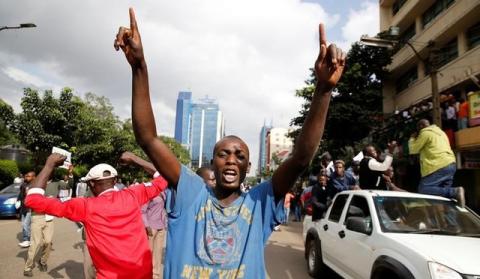Advertisement
Kenyan opposition says two shot dead in protest over vote body
NAIROBI (Reuters) - At least two protesters were shot dead in a rally against Kenya's election body in the western city of Kisumu on Monday, an opposition official said, as demonstrators also gathered on the streets of the capital.
Police had fired into the air to break up a crowd trying to march on the Kisumu office of the Independent Electoral and Boundaries Commission (IEBC), one witness told Reuters.
Protesters, accusing the commission of pro-government bias and demanding its members resign before elections in August next year, blocked roads with burning tyres in both Kisumu and Nairobi's Kibera slum. "IEBC must go," demonstrators shouted.
There was no immediate police comment on Monday's reported deaths. Kenyan television reported at least one person killed.
Western Kenya, traditionally an opposition stronghold, has seen some of the worst violence in the almost weekly protests. Three people were killed in clashes in the region on May 23.
Western ambassadors have accused the police of using excessive force and called for dialogue in a nation prone to political strife. The 2007 election triggered weeks of ethnic bloodshed and the 2013 result was disputed.
DIALOGUE DEMANDED
A meeting last week between President Uhuru Kenyatta and opposition leader Raila Odinga failed to defuse tensions.
Police said on Friday that any march by protesters would contravene a court order and demonstrators could face arrest.
"We have confirmed two people shot dead," Dennis Onyango, spokesman for opposition leader Raila Odinga, saying they had participated in the protest in Kisumu. He said the protests "have been cleared by the court".
The opposition have demanded dialogue on reforming the IEBC. "There is no word yet from State House on our demands," Onyango said, referring to the president's residence and office.
Businesses have called for a swift resolution of the row, saying it was taking a toll on an economy which was hit hard by the post-2007 election violence amid the tensions in the build up to the 2013 vote.
"We must find solutions and the solution must be based on the rule of law. It calls for a lot mediation," Kenya Private Sector Alliance (KEPSA) Chairman Dennis Awori told Reuters, urging to the church, politicians and others to help bring calm.
IEBC commissioners deny any bias and say they will stay on, while the government has said any reform needs to follow constitutional channels, which could involve a petition to parliament where Kenyatta's Jubilee coalition has a majority.
(Additional reporting by Humphrey Malalo in Nairobi; Writing by Edmund Blair; Editing by Andrew Heavens)



















Add new comment